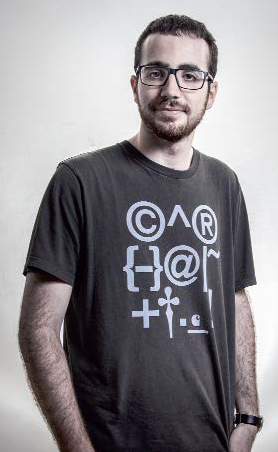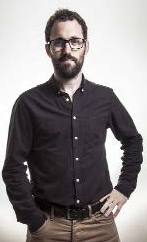Young, non-conformist and with clearly defined ideas. These adjectives describe Santi Pozo, Adrià Recasens and Jordi Valls, three of the people chosen to imagine the future of Barcelona, to explore what defines us as a city and as a society. They represent up-and-coming talent in the Catalan capital according to Bibiana Ballbè, the curator of Fàbrica Futur Barcelona, the movement they are involved in.
Santi Pozo (Terrassa, 1990) is always searching for answers to his problems. Entrepreneurial, tenacious and idealistic, nothing can stop him. A couple of years ago he had an accident on his longboard and decided to design a helmet for high-risk sports-lovers. “I’m a customisation fanatic. If I had enough time I would never buy ready-made stuff, making things yourself is fascinating,” he says. He dreams of designing his own home, creating his own motorbike and home-schooling his children. In a nutshell: living life the way he wants and not the way society imposes upon us.
Pozo believes in ready-to-go architecture and urban development, in solving people’s problems immediately. “Proposing one solution to all our problems makes no sense, because by the time you hit upon the solution the problem might have already changed,” he asserts. An answer that surely comes from his own experience, because after studying architecture, Santi realised that he needed other kinds of knowledge and started to study business administration and management. He eventually dropped out, because he found a school that was free, unrestricted and with all the contents imaginable: the Internet.
In fact, technology is one of the key factors in the formula of the future of this young man. Through surveys, he has detected a major concern among citizens about the financial cost of public transport and the poor quality of coexistence between neighbours. According to Pozo, one of the main sources of stress in big-city inhabitants is their anxiety after a busy day. And the main problem in Barcelona is that people take more than an hour to get from home to work. Hence, his goal is to improve transport through a platform that monitors citizens’ activity: what time they take a certain train, how many hours they spend driving, or their cycle routes. To put it another way: turning the Catalan capital into a lean smart city. A city that, thanks to technology, constantly listens to and monitors the population to learn about its real problems to generate solutions with a low cost of implementation. He has been influenced by Toyota’s lean manufacturing methodology, which seeks to improve company efficiency and reduce costs. And he draws his inspiration from London and Hong Kong, two cities that have helped to prove that technology can deliver added value to society.
Learning how to program
Adrià Recasens, a twenty-four-year-old graduate in mathematics and telecommunications engineering from Barcelona, would certainly agree with the above. A born investigator, meticulous and in love with his work, Adrià uses numbers to express and define himself. He is currently an assistant at the Massachusetts Institute of Technology (MIT), where he is investigating the design and implementation of a smart-home communication protocol. Like Santi Pozo, he believes that the only thing missing from Barcelona’s reality are new ideas.
Recasens is convinced that many of the breakthroughs in recent decades cannot be explained without programming, which he does not hesitate to define as the language of the twenty-first century. “It is an essential tool, because computing is present in every aspect of our lives,” he says. For this reason, he proposes that programming be included in the primary and secondary education syllabuses. The goal is not for everyone to be an expert on the subject, but that they should at least have the grounding needed to understand the world around us, since developments are increasing at an exponential rate.
Thus, the future will not be cold and full of humanoid robots, although, according to Adrià, it will be much more technical. However, and somewhat paradoxically, everything will be easier and simpler to use. Therefore, if we do not want our children to be dominated by technology we must teach them how to program. Some countries, such as Estonia, have already established programming as a compulsory subject, although the big problem continues to lie in the generation gap. Students are often a step ahead, so Adrià’s challenge is to train and motivate teachers. Despite the difficulty of this challenge, Recasens has glimpsed the light at the end of the tunnel and believes that the key lies in creating a digital community of teachers to create synergies and resolve conflicts. All with the ultimate goal, as Mitchel Resnick says, “of new generations learning to code, but even more importantly, coding to learn”.
Technology and social relations
However, technology can also have its dark side. The extreme connectivity of modern society has led to the trivialisation and devaluation of personal bonds. Nobody would deny that the emergence of Facebook has changed our personal relationships almost completely. This is the topic in which Jordi Valls, a graduate in advertising and public relations born 29 years ago in Sabadell, has specialised. This restless entrepreneur feels a great passion for the Internet. He set up Startup Embassy, a house for entrepreneurs in Silicon Valley, and is now working to improve consumer experience through technology and communication.
Over the years, we have seen individualism triumph over the family unit. We have gone from interacting in front of the fireplace to doing so in front of the TV. And we can now almost say that the virtual “agora” has replaced physical contact; we find the warmth of social life before a computer screen or mobile phone.
Jordi is convinced that we will continue in this direction in the future, and he even believes that our relationships will probably be coloured by what machines tell us. Technology, for example, has led to attraction, which had not changed much over the course of history, being transformed in leaps and bounds. Impressions used to be based on the first meeting, but now people have access to the full résumé of their potential partner. Valls claims that in a few years’ time technology and science will go hand in hand and that, for example, genetics will be able determine whether we will get on better with one particular person or another.
Can you imagine an application that reads our brain’s reactions while we look at someone, or that digitises our smell? It is probably not too far away. “This does not necessarily have to lead to dehumanisation”, says Jordi, “since in no way does the rise of technology make us any less human. I think that the trend towards transhumanism will greatly change human ways of living, but not the essence.” Are you ready? Welcome to the future.





